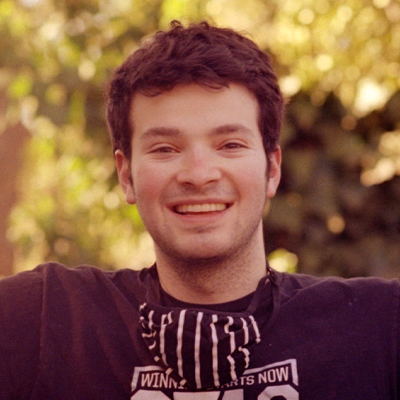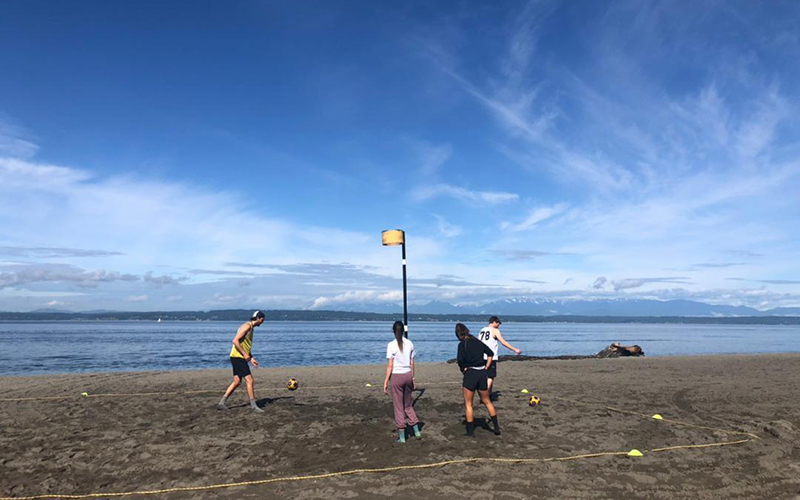
Part of what makes outdoor korfball so appealing is that it can be played anywhere, including the beach. (Photo courtesy of Willard “Bill” Johnson)
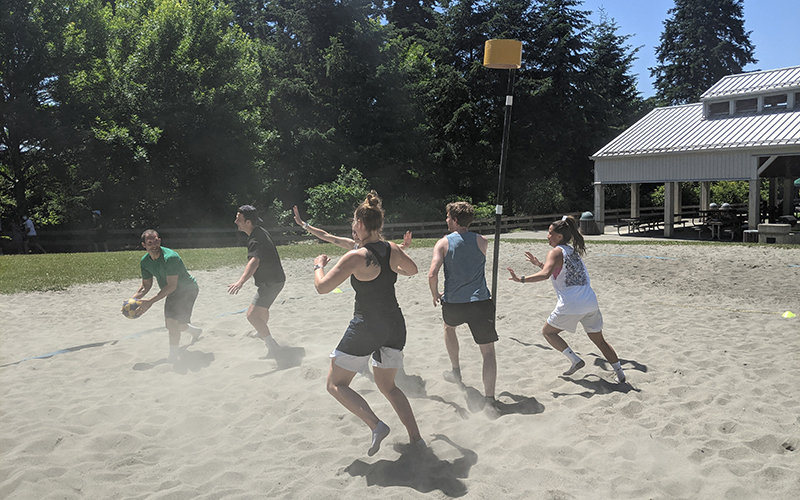
At PNW Beach Korfball in Seattle, Bill Johnson hopes to train a team to compete at the World Beach Korfball Championship in Morocco next year. (Photo courtesy of Willard “Bill” Johnson)
PHOENIX – Before David Warren was a member of the United States national team for the sport of korfball, he was just a college kid at Oral Roberts University in Tulsa who wanted a chance to travel abroad.
“They had this program where at the end of the school year, a team from the school was going to travel to Europe,” he said, “so I thought, ‘Man, I really want to go to Europe, and I’ll play this funky game.’”
Warren of Maricopa was drawn to korfball because it closely resembles basketball, and indeed, korf means basket in Dutch. The purest form of indoor korfball consists of two teams of eight players aiming to score goals in a tall mounted net, where each team is separated into groups of four players who cannot cross the center line.
At the end of each of his four years of college, Warren and his ORU teammates competed in overseas korfball tournaments, in the Netherlands – where the sport originated – Belgium and Germany. And by 1985, Warren was representing the U.S. at the World Games in London and helping the team earn a bronze medal.
When Warren went to the Netherlands, he found a full-fledged support system for the game. He learned from Dutch coaches and visited dedicated korfball clubs with their own locker rooms, training centers and even bars – a whole culture around the sport.
“There’s a lot of korfball marriages, korfball kids,” Warren said.
But Warren, who serves on the board of the United States Korfball Federation, has found it challenging to inspire the same zeal for the sport in Arizona and the U.S. more broadly, where the sports landscape is so crowded. The country hasn’t appeared in a World Games since 1993 or an IKF World Korfball Championship since 2007. The U.S. wasn’t given the opportunity to qualify for the upcoming World Games in 2022, even though the host city is Birmingham, Alabama.
“We wouldn’t even be competitive,” Warren said. “We’d have to play some matches. It wouldn’t take long – I think within the year, you have the right athletes, I think you’d be competitive – but can’t just throw people there and say, ‘OK, basketball players, you’re going to play korfball.”
Key differences from basketball include a prohibition on dribbling, the lack of a backboard, the inability to shoot while a defender is “within arm’s length” and, most critically, the equal division of teams between men and women. Players must guard opponents of the same gender.
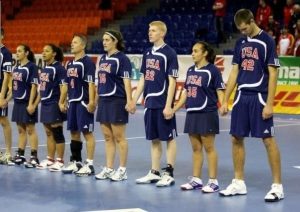
David Warren (No. 4), along with Erika Guijarro (No. 35) and her twin sister, Amanda (No. 3), competed in the 2007 IKF World Korfball Championship in Brno, Czech Republic. Since then, the United States has struggled to field teams for major tournaments. (Photo courtesy of Erika Guijarro)
“That allows for a bigger mix of strategies than you might have in, say, a typical basketball game, where anyone can guard anyone,” said Carl Yerger, president of the United States Korfball Federation. He points out, for example, that a woman would not be permitted to provide help defense against a man breaking toward the hoop.
Yerger is a math professor at Davidson College who was introduced to korfball while studying at Cambridge. For whatever reason, he said, many supporters of U.S. korfball work in education (including him and Warren), which limits their ability to free up time to compete internationally.
“When the korfball championship of the Americas is a week in February,” Yerger said, “well, you know, we’re probably not going to find a team unless a miracle happens.”
In fact, Yerger said school physical education classes provide korfball’s most prominent presence in the country right now. Erika Guijarro coaches basketball at Arleta High School in California with her twin sister, Amanda, and has spread the game to her students. She said she was even prepared to recruit some graduates for a 2022 World Games team if it ever materialized.
Guijarro learned about the game at Hope College in Holland, Michigan, home to a thriving Dutch culture. She and many peers from the college competed alongside Warren at the 2007 Korfball World Championship in the Czech Republic.
“The appeal of getting to play for the United States in a world championship, like, how do you not jump on that opportunity?” Guijarro said.
She hadn’t been good enough for the international level in basketball or softball, but korfball gave her a chance to fulfill a childhood dream, and play with her sister.
“It was kind of a balance … I played on one side, she played on the other side,” she said.
Guijarro has run into logistical difficulties playing the game since, noting that you can’t call a practice on short notice for people spread across Michigan and California. But she’s hoping to aid an upstart group in Seattle aiming to return U.S. korfball to the world stage – on the sand.
“You can play it anywhere – you can play it on the beach, you can play it on the grass,” said Willard “Bill” Johnson of PNW Beach Korfball. “We built our portable hoop so we can kind of just take it with us, and set up shop, and play.”
Johnson, who played basketball overseas and has competed in beach handball at the international level, was drawn to the novel sport of beach korfball as a fusion of his two skill sets. With two local basketball standouts, Ashley Graham (who owned the Guinness World Record for most free throws in a minute by a woman) and Alyssa Shoji, he started hosting training sessions for the sport, which can be played on beach volleyball courts.
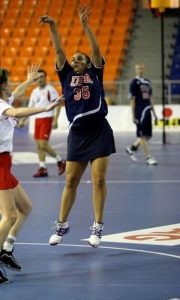
She didn’t get to do it in basketball or softball, but Erika Guijarro fulfilled her dream of representing the United States internationally when she competed in the IKF World Korfball Championship. (Photo courtesy of Erika Guijarro)
He said he relishes korfball’s intricacies, like how the lack of a backboard allows for 360-degree shots, or how the arm’s-length rule minimizes the effects of height.
“Because there’s no physicality, it’s supposed to be noncontact, so that’s kind of a nice aspect, especially one as we’re getting older,” he said. “But no one’s overpowering anyone. It really comes down to skill.”
Johnson said beach korfball is a bit freer than standard indoor korfball, in the sense that it doesn’t require as many people and doesn’t divide the court into strict halves.
He added that Yerger has put trust in them to train as a national team for the inaugural IKF World Beach Korfball Championship in Morocco next year.
Warren said beach korfball wasn’t around when he played, but he thinks it would be an “awesome” fit for Arizona, where it’s warm outside in the winter. His outreach attempts in the state for indoor korfball have not been successful so far, including one conversation several years ago about implementing it as an intramural at Arizona State.
“I think it’d be a great sport for college students because it’s kind of fun, you’re outside, and I was thinking that ASU probably – those students would be interested in at least trying it out,” he said.
But after discussions with the intramural department about logistics, Warren said he never got the chance to demonstrate the sport, even though other sports he considers less valid, like Quidditch, have been welcomed as intramurals.
“I saw that some places were playing that Harry Potter game, whatever that was,” Warren said, “and I’m thinking, if people have been running around with broomsticks, or something like that, whatever they’re doing, they certainly can play korfball, which is actually a legitimate sport.”
Even though the sport’s similarity to basketball has attracted players like Guijarro and Warren himself, Warren said it also makes it difficult to expand the sport. Yerger agreed.
“There are a lot of really great sports already,” Yerger said, “and there’s a lot of competition for games where there are people to play with, with equipment that’s already there.”
But to hear the sport’s leaders tell it, beach korfball represents a new avenue for growth in Arizona and beyond. As Warren put it, Johnson’s efforts in Morocco may be a “stepping stone” back to the world championships.
